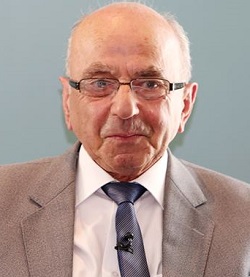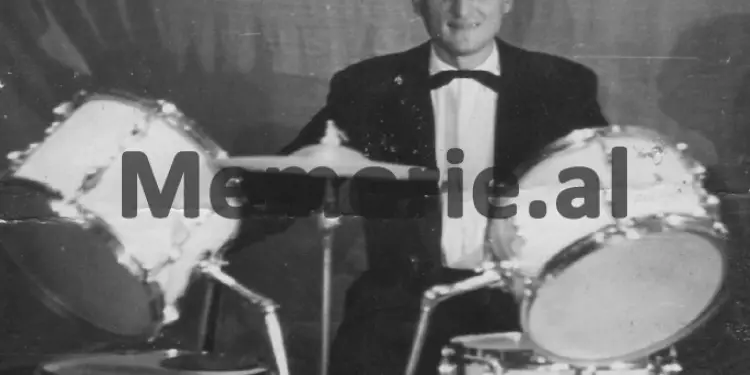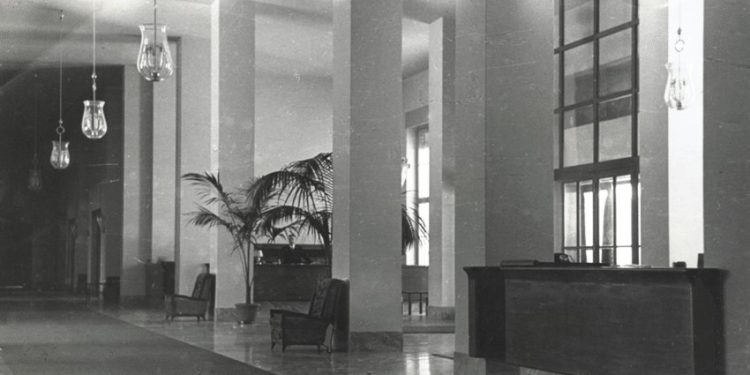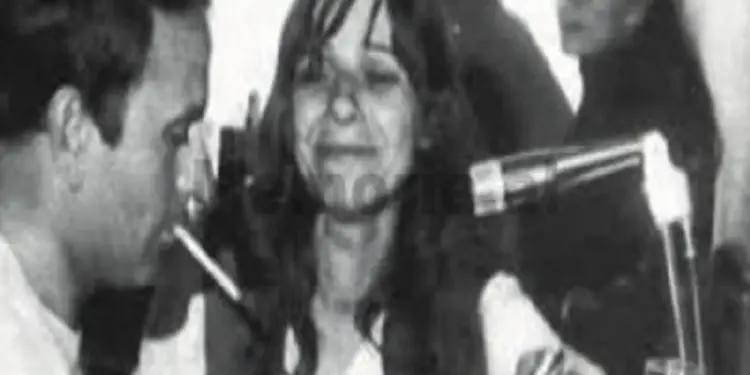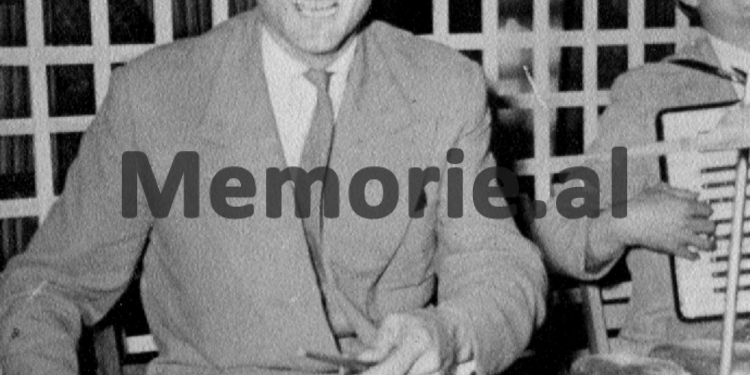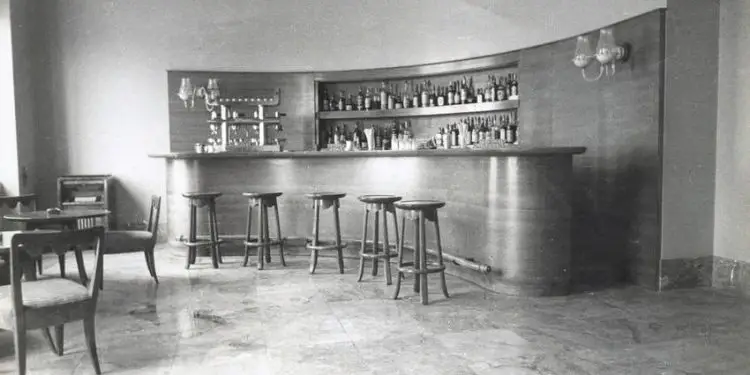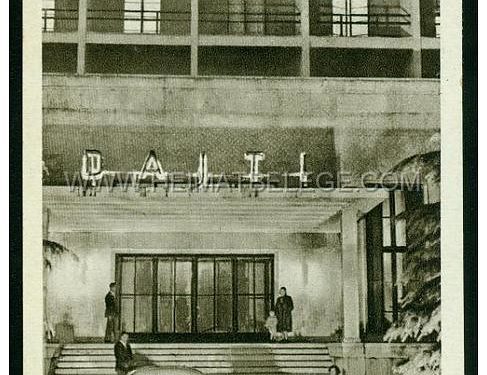From Gëzim Peshpia
Part four
Memorie.al / From time to time I had published some writing about disconnected events with the permanent hesitation towards the well-known pens that brought this tragic time through their books. Even the passive description does not work, that’s why I had to become a commentator of this period in order to present not only the tragic, but in general the life. With these glimpses of stories I do not pretend to bring vivid images, but a very small contribution to the memorial in honor of their memory.
Continues from last issue
I will tell you about the mundane Tirana of the 60s
At the Ballsh Oil Refinery, for a long time, there was a loud and rather disturbing noise which forced us to speak loudly with the interlocutor. Because of this, many of the prisoners’ voices became hoarse and many of them suffered from insomnia.
Many of us also had nervous disturbances, while a strange phenomenon happened to me; this noise helped me to imagine myself outside this environment, especially at dinner. On the shore near the silos, I squinted and from the lights of the factory I saw a giant ship, decorated with colorful lighting.
Cold winter night. With my head tucked into a makeshift scarf as a hood, I give free rein to memories to bring me fragments of winter nights in my city. Nostalgia that makes me smiles.
We were going out with my childhood friend, happy that it was Saturday evening. On the boulevard, many students who had returned from various countries of the People’s Democracies stood out. However, we were on the verge of breaking relations with the Soviet Union and the countries of the Socialist Camp. Winter had come interestingly.
It had snowed twice. The photographers in the flower garden in the center of Tirana hardly had time to change the films of the cameras. At dinners, during the “round”, the river of people unfolded the “fash-fashes” of the currency shop, the checkered jackets of the combine and no hats, because they were a sign of the bourgeoisie, which art had anathematized in novels and films.
Rarely, anyone had any relic from the time of the War still unworn, but even he came with the embarrassment of some “revolutionary” spoto. Association of ideas! This reminded me of the “roundabout” in the prison yard, where a mass of hundreds of people seemed to add to the hum of that exhausting noise that came from a vent, somewhere near the highest chimney.
Only “fashion” had its speciality: the coats were mostly brown, the hats colorful (a sign of liberalism, in order to save, civilian clothes were also allowed). The vortex would stop its movement with the drop of the bag and the whole mass would be arranged in rows.
The appeal began. When it shot repeatedly, it was real torture, because the cold was felt more when there was no movement.
“Jiroja” in Tirana, depending on the weather and holidays, changed its shape like a huge amoeba.
Sometimes he went around the center or started from “Zingoni”, to the Maternity. With the return of students from abroad, this phenomenon had undergone its metamorphosis. The line-up had another “marschrout”, being stationed in the direction of the “Dajti” hotel, sometimes going all the way to the University.
This stroll (you can’t call it a walk) was considered something special, it was a ritual, as it was said, a privilege of small centers, especially in underdeveloped countries.
People treated it like a show. The girls were exposed as in a fashion show and often took the first steps to get to know “candidates” for engagement. A chuckle was enough at the beginning, which in the second rotation turned into a greeting. Love stories often began here. To go on a tour, special preparation was made. Both sexes were seriously concerned.
Exchanges of clothing between sisters or cousins were not excluded. They often extended to friends. Mothers’ clothing was often modified. Some of them were lucky enough to wear clothes that were brought to them from abroad. These stood out with their fingers and enjoyed the privilege of not looking like provincial boarders.
Even the standard of dress underwent its metamorphosis as the shoot with the arrival of students. Czech boots with thick rubber were followed by all kinds of models, notably those coming from the German Democratic Republic and Poland.
These also brought the short coats above the knee, which became the object of “Bodec”, (satirical wall paper) posted on “Barricade Street”, where cartoons accompanied by verses, unmasked the “fashion”, of the most flourishing poverty in all People’s Democracies, sister.
After completing the first rotation or “lap”, we remembered that we were late for “Vollga”, where the reservation of places starts at 19.00. There were fiances who left someone at the table very early, and after consuming a couple of bottles of beer, he left it to the couple. Afterwards, these tables were no longer suitable for a couple, because cousins, friends and friends came there, until the restaurant hall was full.
We were sitting in the corridor waiting for Andoni or Xhoxhi to give us the sign that someone would pay. We would fold our coats and head towards that table, standing to give the impression that we would be its next occupants. After the celebration, we greeted Lam, Bardhi, Mehdi, Sazan and Urim, as “of the house” that we were.
The atmosphere was heated. The Hungarian ensemble that came to perform was lined up at a long improvised table of five small tables. “Komparsita”, was skillfully executed by the orchestra and its staccatos had to do with the adrenaline of the audience.
A Hungarian couple showed virtuosity in their performance. People flocked from the annexes of the bar to the hall. Applause. The magical lam starts rhapsody no. 5 of the List. Amazing effect! The Hungarians were amazed.
“Chardash”. Lam steps down from the podium onto the dance floor. With elegant movements and interpretation to perfection, he electrified the hall. Near us, the waiter was frozen with a plate in his hand. Someone mentions him and he makes a gesture as if coming out of hypnosis, shakes his head and smiles.
Cheers. Hakiu, a music student returned from Sofia, enters and greets us by raising his borsalina, ignoring the faces of a couple of tables, and asks us for permission to sit at our table.
Borsalino, was the young woman he brought from a country with a regime like ours. We debated, weighed, analyzed, dissected that hat and came to the conclusion that: communism there was more tolerant than ours. Mehdi plays with his guitar “Beetle” and “Bells”.
Enthusiasm grows. The Hungarian ensemble stands up and applauds. On their behalf, two waiters hire the orchestra. Two Hungarians accompanied them from behind and thanked him in French; it was a surprise for us. “We didn’t expect to meet great masters like you in this bar, who you hardly meet even in concerts…”!
A short man appeared at the door and beckoned to the waiters. Without further ado, the orchestra packed its tools. We had come to enjoy ourselves. We leave for the “Dajti” hotel. We left our coats in the wardrobe and entered the tavern hall. Grazing our eyes tactfully, we briefly contemplate the tables of the embassies on the left.
Seemingly indifferent, we glance at the beautiful daughter of the Turkish ambassador, who was walking towards the door to enter the grass. On the right, on the table near the mirror, as usual in the corner, the “kalecats”: Zyd Aga, Gani Kodra and company. A layer of smoke drifted across the grass, creating ripples every time the hall door was opened.
In front of Dhori’s counter, more than twenty people were “assembled” in groups, crowded between them. The secretary of the Yugoslav Embassy, Rado, gallant and provocative, asked permission in Albanian to pass: “Good evening…! Excuse me…”!
Most of the crowd consisted of students returning from the East. Among them, Angel, “charmant”, stood out, reaping victories by speaking with gestures in order, in French, Russian, Hungarian, Italian or German. The group of Poles constituted the majority.
Among them, Jorgo and Faiku stood out, both holding cigarettes between their long, thin fingers. The door opened and Lin’s voice was heard, singing with diction in the Shkodran dialect, Buscaglione’s “Guarda che luna”. Someone was entering, laughter…! Czesc Panoëie! Co slychac noëgo? A cocktail please…! A colorful glass was passed from hand to hand to the newcomer.
The door opened again…Servus…Esta ultima Cansion que yo te canto…! The song “In Voga”, from the Mexican film, came between the smoke, the laughter and the clinking of the glasses that sparkled with the colors of the rainbow. As if to illustrate the moment, Bebek’s charming face appeared, whose mustache went in harmony with the bow tie he wore.
Wearing the bow tie was justified since he came straight from the show and had nowhere to change, because he lived in Durrës. Doctor Cyneja made room for them and they both looked like characters from the thirties…!
I open the door and motion to Tonin, who was playing the piano. This is where Carosone’s “Rock and roll” couplet, “Tu vuoi far l’americano” began. People were afraid to dance it. This privilege was enjoyed by Stefan, the son of the Polish ambassador, who danced with a girl from the Italian embassy. Finally, Caesar is seen accompanied by Raqi and Ruzhdiu, who came from Durrës.
Hello everyone between us. Most were familiar. It was almost a family atmosphere. For every new stranger who came, rumors started and for a quarter of an hour all the participants had his ‘Curriculum Vitae’ at their fingertips Twist. The Turkish beauty squirmed.
Behind the door, we followed her movements excitedly. Feri, euphoric, hugs us and asks us: “Are you going to put the layer of coffee, in ciornoje morje”? The slang code would say: “Going for coffee at “Crimea”?
There was the last station. The steam-coated windows didn’t allow you to see inside. Maria at the counter, a woman with a compassionate look, did not last long with someone who could not pay for the coffee. The door opened. The table next to her was unpopular.
“Add? …Skurczybyk…Cure mac…Servus”! Forget the Valarena mule. The latter was the hoarse voice of Xelal, to whom the interlocutor, Niko the cobbler, spoke: “Je suis vraiment trompe de toi”! They made the most charming pair of drinkers.
After “fiery” debates, the hills along the coast came out swinging to go who knows where. Met Myzyri, makes room for us at his table. He was talking to one who kept his eyes half closed. He took out a yellowed photo from his inner pocket, where he looked on Tirana Boulevard before the war, a handsome man in a suit and borsalino. That was me…!
“Ab halebun”! An ostensibly Arabic greeting by Lup, a porter with thick lips, is accompanied by a temena. Our race…comes from Syria and Egypt, and some of our race from India, – explained Lupi – like a burnt demographer, who lived with a young man in the ‘New Market’, in a shack, at the entrance of the alley Maleshka. We leave the last station and head to “Avni Rustemi” Square. Next to us, in a row, in a row of five people, the hotel “Stadium” is addressed.
The row is led by Andoni, the former player of “Volga”, and was closed by Margarit the pirate who, although with one eye, was well oriented in the potholed alley that shortened the distance to the stadium. There they slept under the stairs against the tribune, on cardboard beds that prevented the dampness of the cold a little. We walk commenting on the heroism of our comrades “senza tetto”.
At the roundabout next to Avni’s bust that was shining from the frost, we meet the barber-poet, Ramiz, with yellow hair, our friend of the late hours. We approach him as he begins reciting:
“Oh, our honor, men of steel,
Albanians and nephews of Skanderbeg at the same time!
The white ray is given, yes, by the sun
That you forgot this fairy of mine.
For you it will be known on the lute of Malcis”.
He raised his index finger in our direction. His yellow hair and mustache were straight and rebellious. His eyes were shining. During the recitation, his shirt had come off and was white on his pants. Beating his chest with his fist full of pathos, he created the beautiful but difficult cadence of Fishta, which seemed to rise in the cold air, creating stairs to climb to the poetic hooves.
He suddenly burst into a curb and grabbed the railing with one hand, while with the other he raised it up and between the clenched fingers, separated the pointer, while his voice rang out: “We are children of the new century…”!
We continue walking, although we are still being followed by Migjeni’s verses from a voice that came and went.
Here is our beloved alley. On a curb, Vasili with a guitar accompanies the serenade of Rudolph, the singer so loved by us young people, “Buongiorno tristezza”, “Triste domenica”, “Stella d’argento”…! The songs followed each other. From her window Bebi, our neighbor, clapped her hands and occasionally called out: “Well done, good luck!”
From the second floor of the house close to us, the voice of Birçe, a prison officer, was heard: “Enough with these bastards”!
Rudolph: “The outside world, they say thank you when…”!
– “Well, we are not the world…”!
“How can we do with samples like you…”?!
The next day at 18.00, there was a variety show. The director, Mihallaq Luarasi, introduced the new, modern for the time, full of courage, which was eagerly seized by us. The climax was reached when the great singer, Vaçe Zela, sang the song “Cammino”.
Despite the appropriate comment that, this song was sung in the hopeless capitalist world, the allusion was strongly felt.
“Cammino, cammino, io cerco il mio Mondo
C’e buio profondo
Il sole dov’e
Io stringo una nuvola, le mani che tremano…!
Vaçja stood strong on his open legs like a tree against a storm. A shaft of light came from the lodge to her left and ended at her. While she sang… “io stringo una nuvola, le mani che tremano…”, her arms were stretched out towards the source of light, while her shaking hands seemed to be trying to grab what she so desired: Freedom!
The hopes that crumbled…!
I am shaken by the memories and I see a good part of those characters who played in black and white in the middle of the night…! Here is the barber-poet, Ramiz, shriveled, hunched over, almost dragging his feet, three meters below in the prison yard.
Mihallaq Luarasi, the only one in that yard with a Russian crown on his head, does not walk, but almost runs up and down alone, with his thoughts of course not happy. The wolf flaps its hands, move its legs in a rapid place-number.
Mehdi, the wonderful musician, asks up and down hoping to fish for some optimistic news, for amnesty!
The “Polish group”, the whole society, was almost entirely as they had once been free, but now segregated; the shepherd often remembered fragments of their investigation.
The “Polish Agent Group”, “Dinamo Terrorist Group”, “Military Group”, “Navy Group” (Landi, Harun, Maksi, Alauddin, grandson of Hysni Kapo, etc.) were mentioned outside, and others in a row like these.
Even tonight, the shooting continues on the boulevard of Tirana and in the prison yard…! I don’t know where I am and who I am for. My friends are waiting for me and I long for them.
But there is also the bag that interrupts my train of thought, so I break away from my city and run to the line. The appeal of my prison…! Memorie.al
The next issue follows




